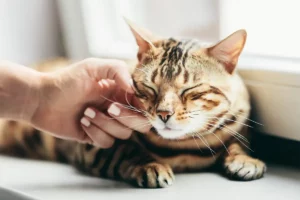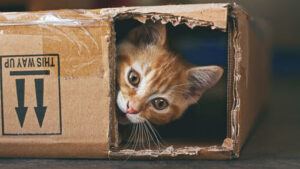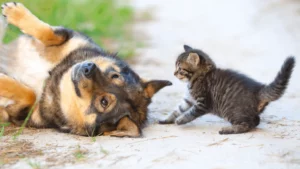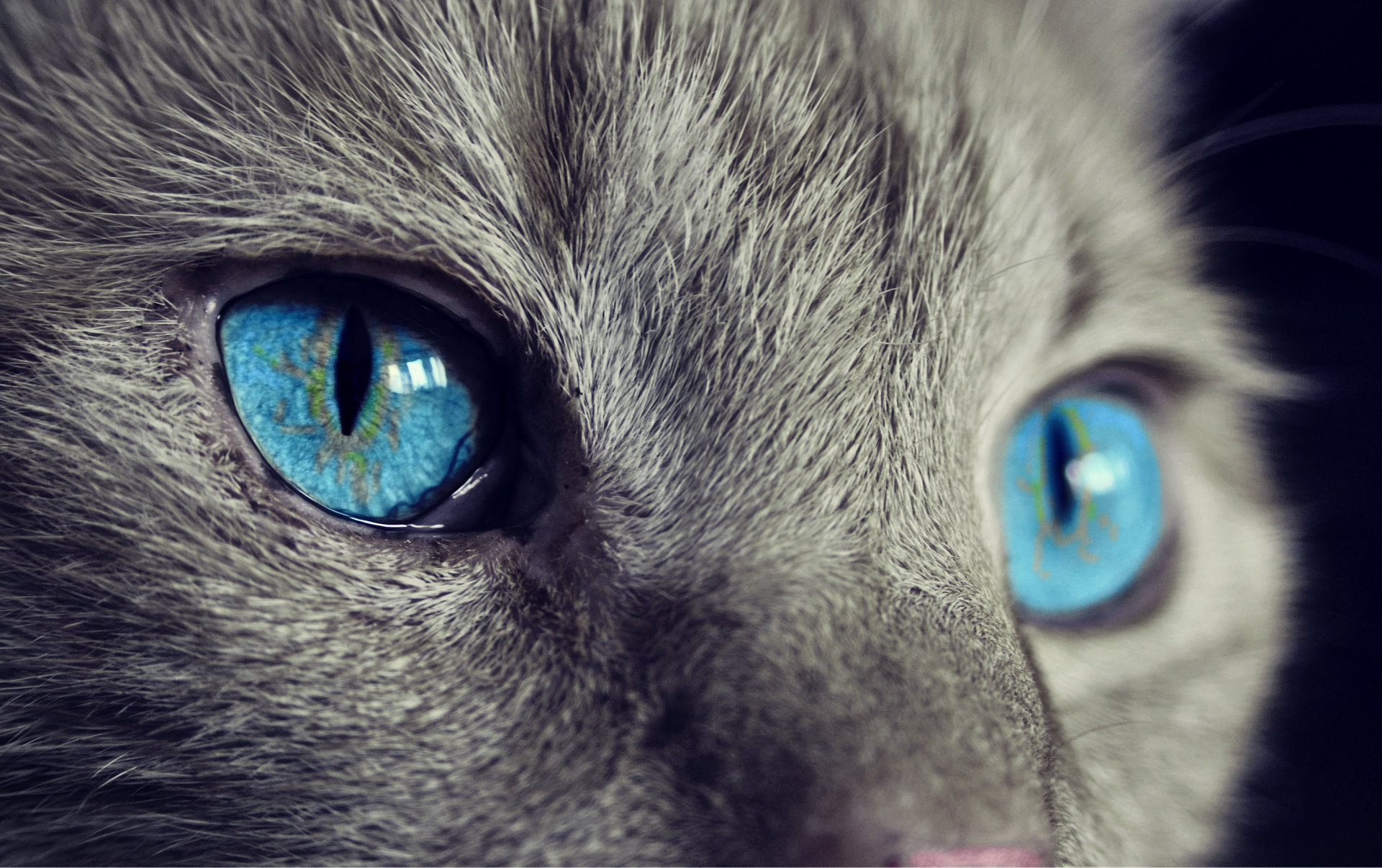I’m often asked about the soft, rhythmic sound that seems to epitomize contentment in cats: the purr. It’s a sound that resonates not just with the animal kingdom, but with the human heart as well. When a cat sits, curled in your lap, the gentle vibration and quiet hum can be one of the most calming experiences in the world. But why do cats purr?
Kittens begin purring at just a few days old, a method for them to ‘speak’ to their mothers. The gentle purrs of a mother cat serve a similar purpose, soothing her kittens much like a lullaby does for a human baby. This early communication establishes purring as a vital part of a cat’s life from the very start.
The reasons why an adult cat purrs can be varied. Often, it’s a sign that they’re happy to see you, or it’s their way of telling you to continue that enjoyable scratch behind the ears. There’s also that unique ‘squeak purr’ they make when they’re hungry, highlighting just how multifaceted this behavior is.
A less known fact is that cats purr not only for communication or out of pleasure but also for self-soothing when they’re in pain. Imagine that—a sound that can reportedly ease discomfort with its vibration. It really does underscore how fascinating and resilient cats are.
Now, considering the intriguing aspects of a cat’s life, especially their purring, one might wonder about their overall well-being and lifespan. The longevity of our feline friends is a topic that cat parents are deeply interested in, as it gives insight into the care and companionship we can offer them over the years.
The Lifespan of Cats: Factors and Expectations
I understand why you’re curious about your cat’s lifespan. The idea of losing a beloved pet is tough to think about, but knowing what to expect can help us cherish the time we have with them. A healthy pet cat typically enjoys a lifespan of 13 to 17 years. But how long your furry friend will be with you depends on several factors.
Genetics plays a role, but external factors often have a more direct impact. For example, neutering can significantly extend a cat’s life. Neutered males tend to roam less, reducing their risk of accidents and fights, while spaying females eliminates the health risks associated with pregnancy and childbirth.
Your cat’s quality of life is fundamental. A well-balanced diet, regular veterinary check-ups, and a safe indoors environment can all boost their chances of a longer life. Watch out for changes in their behavior or health and address issues promptly with professional advice.
Are you curious about how your cat’s age translates to human years? It helps to understand their life stages. A ‘cat-to-human years calculator’ could be interesting if you’re trying to relate your cat’s age to a human’s lifespan.
What we’ve covered sets the stage for what comes next: why do cats do the things they do, such as kneading and squeezing into seemingly too-small boxes? These endearing behaviors are rooted in instinct and emotion. You’ll find there’s a lot more to your cat’s contented kneading and box obsession than meets the eye.
Decoding Cat Kneading and Box Obsession
If you share your home with a cat, you’ve no doubt witnessed the curious behavior of kneading. Picture your cat, perched on a soft throw cushion, rhythmically pressing one paw after the other, as if keeping time to a song only they can hear. This gesture harks back to kittenhood, a time when kneading was a signal to their mother to let the milk flow. As adults, when cats knead, it echoes feelings of safety and contentment from those early days. A cat kneading on your lap isn’t just finding comfort; it’s also giving you a heartfelt compliment.
Kneading could also be an expression of ownership, as cats have scent glands in their paws. When your cat kneads your lap or a blanket, they might be saying, ‘This is mine.’ But worry not, for in the language of cats, this is an endearing declaration of belonging and trust.
 And then there’s the universally amusing sight of a cat in a box. Your living room could be filled with the coziest cat beds, yet your kitty might still choose a cramped cardboard box every time. Wild instinct drives this preference; a box is a perfect hideout for stalking prey. Your domestic hunter may be far removed from the jungle, but those ancestral feelings remain strong. Boxes also satisfy a cat’s penchant for warmth and security—the cardboard provides an insulating layer that holds body heat.
And then there’s the universally amusing sight of a cat in a box. Your living room could be filled with the coziest cat beds, yet your kitty might still choose a cramped cardboard box every time. Wild instinct drives this preference; a box is a perfect hideout for stalking prey. Your domestic hunter may be far removed from the jungle, but those ancestral feelings remain strong. Boxes also satisfy a cat’s penchant for warmth and security—the cardboard provides an insulating layer that holds body heat.
Do your cats love chewing on the corners of these boxes, or lounging in them for hours? This behavior is part of their mission to explore and master their environment. By providing a box, you’re offering a haven where your cat can feel in control. And if you cut out some peepholes, you might just become your cat’s favorite person!
Understanding these behaviors enhances the bond you share with your cat. As you learn to read and respect these natural instincts, you strengthen the trust between you. Now, empathy for your cat’s world sets the stage for exploring more quirky traits, such as their discerning palate and reproductive behaviors—which, intriguingly, present yet another set of fascinating facts to consider.
Embracing Your Cat’s Unique Traits and Needs
A cat’s natural instincts and behaviors are a window into their fascinating world. Through understanding why cats avoid certain foods like chocolate, and recognizing the subtle signs of pregnancy, you empower yourself to provide the best care for your feline friend.
Remember, chocolate contains theobromine, which is toxic for cats (and dogs), so it’s crucial to keep such treats out of their reach. Cats may not crave sweets, but their curiosity could lead to unintended ingestion.
Cats experience a relatively short pregnancy compared to humans, staying pregnant for about 65 days on average. As a pet parent, it’s important to be attentive during this period. A vet’s expertise can be INVALUABLE when confirming pregnancy and assisting through the stages.
 Whether you’re marveling at their contented kneading or laughing as they pounce from a cardboard box, your cat’s unique traits bring JOY and MYSTERY into your life. Above all, remember that caring for a cat means respecting their NATURE and providing a SAFE, LOVING home.
Whether you’re marveling at their contented kneading or laughing as they pounce from a cardboard box, your cat’s unique traits bring JOY and MYSTERY into your life. Above all, remember that caring for a cat means respecting their NATURE and providing a SAFE, LOVING home.
By doing so, you’ll ensure a lasting bond and many years of shared happiness. Cats may be independent creatures, often enigmatic, but responsiveness to their needs fosters TRUST and AFFECTION. Nurturing your bond with your cat isn’t just about understanding them—it’s about celebrating every quirk and purr.


Hello, I didn’t know all those information about cats! Yes, I did know that cats had relatively short pregnancies, but I didn’t know that it was an exact 65 days! And yes, I’ve noticed that cats purr to self-soothe as well. I’m of Cameroonian descent and we tend to say that cats announce deaths as well, especially if they cry like babies! It happened once when I was a child. We heard a cat “crying” and 3 days after, we heard that a neighbor passed away! Insane!
There has always been a certain mystery surrounding Cats, many believe that they have a link to the supernatural. I do not know if that is correct, but it adds to their allure!!
Thank you for the comments
Kind regards Tim